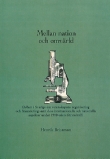Tyck till om SwePub Sök här!
onr:"swepub:oai:lup.lub.lu.se:a78c2820-bcad-48bc-ae7a-03da46357247"
Sökning: onr:"swepub:oai:lup.lub.lu.se:a78c2820-bcad-48bc-ae7a-03da46357247" > Mellan nation och o...
- 1 av 1
- Föregående post
- Nästa post
- Till träfflistan
Mellan nation och omvärld : debatt i Sverige om vetenskapens organisering och finansiering samt dess internationella och nationella aspekter under 1900-talets första hälft
-
- Brissman, Henrik (författare)
- Lund University,Lunds universitet,Institutionen för kulturvetenskaper,Institutioner,Humanistiska och teologiska fakulteterna,Department of Arts and Cultural Sciences,Departments,Joint Faculties of Humanities and Theology
- (creator_code:org_t)
- ISBN 9789197909501
- 2010
- Svenska 502 s.
- Serie: Minervaserien, 1650-7339
- Doktorsavhandling (övrigt vetenskapligt/konstnärligt)
Abstract
Ämnesord
Stäng
- Between the nation and the surrounding world - Debate in Sweden regarding the organisation and financing of research and its international and national aspects during the first half of the twentieth century My thesis regards the attitude of the Swedish research society to research as a national and an international phenomenon during the period 1900-1950. My work relates to the question in which way the landscape of the research policy of the surrounding world has influenced Swedish research during this period. Primarily it deals with a change between German and American influences. The aim is to give a contribution to the understanding of the national and international character of research. The thesis consists of three parts; Part 1 deals with the international landscape of organisation and co-operation in research. Such phenomenon as the German “Mandarins”, when the Nazis seized power of in Germany, the progressive ideal of research, “Bernalism” and the consequences for science in Europe and United States through the financial support from Rockefeller Foundation and Carnegie Foundation is discussed. A picture of the fundamental feature concerning the relationship between research, economy and politics in Europe and United States is given. In order to relate the international picture to the Swedish conditions, I discuss the debate regarding to the societal role of research within the Swedish research society, there I show the span between the national and international aspects concerning Swedish research. The national motive was strong and a legitimizing element for the actors of research, both when they articulated their needs in political discourses and in the national debate. They argued that the destiny of the nation was dependent of that research had a leading role in the society. Most of the problems in society could be soluted with scientific methods. The discussion of the freedom of research and it’s societal use was in great respect influenced of contemporary international currents, even though the national perspectives and priorities were the most important. Part 2 deals with five studies, the boundary organisation The Royal Academy of Engineering Sciences (Ingenjörsvetenskapsakademien), the professional organisation The Swedish Society of Medicine (Svenska Läkaresällskapet) and the research councils, Medical Research Council (Medicinska forskningsrådet), The Research Council of Social Sciences (Samhällsvetenskapliga forskningsrådet) and The Humanistic Fund (Humanistiska fonden). In these studies I focus on the international relations of the scientific organisations. Part 3 will show the results in a summary discussion. I argue that the view of the Swedish research society on international scientific cooperation is connected with the national needs and motifs. International and national motives are no way contrary to each other – if no nations, then no internationalism. From the point of view of the scientific organisations, there are no evidences that Swedish researchers and scientific-political actors were so unambiguous dependent of German science and science politics. Instead there was a complex mosaic of international relations, which were concerning several nations, and Germany was one among many, even if it was an important one. United States, Great Britain and the Nordic countries were other important nations to have a scientific exchange with, and in some cases more important than Germany.
Ämnesord
- HUMANIORA -- Annan humaniora -- Kulturstudier (hsv//swe)
- HUMANITIES -- Other Humanities -- Cultural Studies (hsv//eng)
Nyckelord
- boundary organisation
- research
- scientific relations
- scientific ideological debate
- scientific exchange
- The Research Council of Social Sciences
- The Fund of Human Sciences
- The Medical Research Council
- The Swedish Society of Medicine
- research council
- The Royal Academy of Engineering Sciences
- professional organisation
- internationalism
- nationalism
- financing of science
- freedom of research
Publikations- och innehållstyp
- dok (ämneskategori)
- vet (ämneskategori)
Hitta via bibliotek
- Mellan nation och omvärld debatt i Sverige om vetenskapens organisering och fina... (Sök publikationen i LIBRIS)
Till lärosätets databas
- 1 av 1
- Föregående post
- Nästa post
- Till träfflistan
Hitta mer i SwePub
- Av författaren/redakt...
- Brissman, Henrik
- Om ämnet
-
- HUMANIORA
- HUMANIORA
- och Annan humaniora
- och Kulturstudier
- Delar i serien
- Minervaserien,
- Av lärosätet
- Lunds universitet
Sök utanför SwePub
- Sök vidare i:
- Google Book Search
- Google Scholar
Kungliga biblioteket hanterar dina personuppgifter i enlighet med EU:s dataskyddsförordning (2018), GDPR. Läs mer om hur det funkar här.
Så här hanterar KB dina uppgifter vid användning av denna tjänst.
- Copyright © LIBRIS - Nationella bibliotekssystem
- LIBRIS.kb.se

